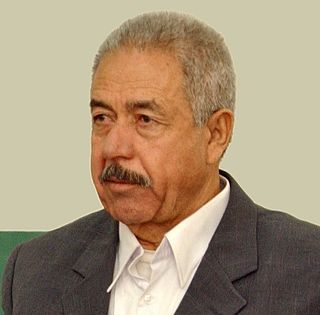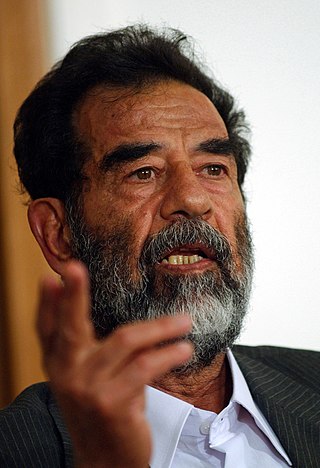
Iraq under the Arab Socialist Ba'ath Party saw severe violations of human rights. Secret police, state terrorism, torture, mass murder, genocide, ethnic cleansing, rape, deportations, extrajudicial killings, forced disappearances, assassinations, chemical warfare, and the destruction of the Mesopotamian marshes were some of the methods Saddam Hussein and the country's Ba'athist government used to maintain control. Saddam committed crimes of aggression during the Iran–Iraq War and the Gulf War, which violated the Charter of the United Nations. The total number of deaths and disappearances related to repression during this period is unknown, but is estimated to be at least 250,000 to 290,000 according to Human Rights Watch, with the great majority of those occurring as a result of the Anfal genocide in 1988 and the suppression of the uprisings in Iraq in 1991. Human Rights Watch and Amnesty International issued regular reports of widespread imprisonment and torture.

Ali Hassan Majid al-Tikriti, nicknamed Chemical Ali, was an Iraqi military officer and politician under Saddam Hussein who served as defence minister, interior minister, and chief of the Iraqi Intelligence Service. He was also the governor of Kuwait during much of the 1990–91 Gulf War.

Ann Clwyd Roberts was a Welsh Labour politician who served as Member of Parliament (MP) for Cynon Valley for 35 years, from 1984 until 2019. Although she had intended to stand down in 2015, she was re-elected in that year's general election and in 2017 before standing down in 2019. Clwyd is the longest-serving female MP for a Welsh constituency.
Faisal, Faisel, Fayçal or Faysal is an Arabic given name. Faisal, Fayçal or Faysal may also refer to:

Human rights in post-invasion Iraq have been the subject of concerns and controversies since the 2003 U.S. invasion. Concerns have been expressed about conduct by insurgents, the U.S.-led coalition forces and the Iraqi government. The U.S. is investigating several allegations of violations of international and internal standards of conduct in isolated incidents by its own forces and contractors. The UK is also conducting investigations of alleged human rights abuses by its forces. War crime tribunals and criminal prosecution of the numerous crimes by insurgents are likely years away. In late February 2009, the U.S. State Department released a report on the human rights situation in Iraq, looking back on the prior year (2008).

During the early stages of the Iraq War, members of the United States Army and the Central Intelligence Agency committed a series of human rights violations and war crimes against detainees in the Abu Ghraib prison in Iraq. These abuses included physical abuse, sexual humiliation, physical and psychological torture, and rape, as well as the killing of Manadel al-Jamadi and the desecration of his body. The abuses came to public attention with the publication of photographs by CBS News in April 2004, causing shock and outrage and receiving widespread condemnation within the United States and internationally.
Human rights in pre-Saddam Iraq were often lacking to various degrees among the various regimes that ruled the country. Human rights abuses in the country predated the rule of Saddam Hussein.
The Iraqi High Tribunal (IHT), formerly the Iraqi Special Tribunal and sometimes referred to as the Supreme Iraqi Criminal Tribunal, is a body established under Iraqi national law to try Iraqi nationals or residents accused of genocide, crimes against humanity, war crimes or other serious crimes committed between 1968 and 2003. It organized the trial of Saddam Hussein and other members of his Ba'ath Party regime.

Lesbian, gay, bisexual, and transgender (LGBT) people in Iraq face severe challenges not experienced by non-LGBT residents. Openly LGBT individuals are subject to criminal penalties under the 2024 law making homosexual relations punishable by up to 15 years in prison with fines and deportation; the 2024 law also criminalizes and makes punishable by prison time promoting homosexuality, doctors performing gender-affirming surgery, and men deliberately acting like women. Discrimination is also widespread. Openly gay men are not permitted to serve in the military and same-sex marriage or civil unions are illegal. LGBT people do not have any legal protections against discrimination and are frequently victims of vigilante justice and honor killings.
Camp Nama was a military base in Baghdad, Iraq, originally built by the government of Saddam Hussein, from which its name derives, and now used by Iraqi military forces. Purportedly, the original Iraqi name has been repurposed by U.S. personnel involved with the facility as a backronym standing for "Nasty Ass Military Area".
In the runup to the 2003 invasion of Iraq, press stories appeared in the United Kingdom and United States of a plastic shredder or wood chipper into which Saddam and Qusay Hussein fed opponents of their Baathist rule. These stories attracted worldwide attention and boosted support for military action, in stories with titles such as "See men shredded, then say you don't back war". A year later, it was determined there was not enough evidence to support the existence of such a machine.
Baghdadi or Al-Baghdadi may refer to:

The execution of former Iraqi president Saddam Hussein took place on 30 December 2006. Saddam was sentenced to death by hanging, after being convicted of crimes against humanity by the Iraqi Special Tribunal for the Dujail massacre—the killing of 148 Iraqi Shi'ites in the town of Dujail—in 1982, in retaliation for an assassination attempt against him.
The government of Iraq is defined under the current Constitution, approved in 2005, as an Islamic, democratic, parliamentary republic. The government is composed of the executive, legislative, and judicial branches, as well as numerous independent commissions.
Article Four may refer to the 4th article of any regulatory document, such as:
Abdul Rasul is an Arabic male given name, meaning servant of the prophet.
Ministry of Human Rights may refer to:
Shatha or chada , also spelt Shada, is an Arabic female given name meaning "scent, fragrant, aroma".
Fadhil is a given name. Notable people called Fadhil include:

On February 25, 2021, the United States military carried out an airstrike on a site which it believed to have been occupied by Iranian-backed Iraqi militias operating from across the border in eastern Syria. The unilateral operation was in retaliation for multiple rocket attacks against U.S. forces in Iraq ten days prior and was the first known offensive military operation carried out under U.S. president Joe Biden.







